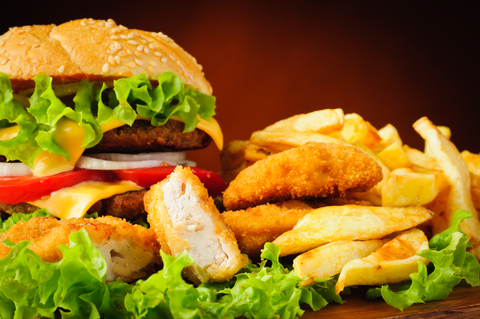January often brings a new commitment to diet and exercise. Unfortunately, many of these diets fail. But what if there were an alternative to dieting that helps you eat in a healthier way, leaving you feeling good emotionally and physically? Intuitive eating fills that role.
Problems with Diet Culture

Diet culture teaches us that we are supposed to look a certain way in order to be healthy. If you don’t look skinny, fit, and active, society assumes you aren’t healthy, don’t have discipline, and are lazy. It teaches us that we should cut carbs, or only eat low fat foods, or only eat during certain hours.
Diet culture finds value in shame. You should be ashamed of your weight and your eating habits. And you should use that shame to “shape up.”
But in reality, your weight doesn’t say anything about your health. People who weigh less get the same diseases as people who weigh more. Likewise, people who are considered “skinny” can also be unhealthy. Health depends more on behaviors rather than your weight.
So if you want to be healthy, shouldn’t you diet? Actually, diets aren’t designed to make you healthier. Instead, the back and forth in weight actually affects your health more than simply gaining weight.
An Alternative to Diets
If diets don’t work, then what can you do to be healthier? Intuitive eating is one option. This style of eating consists of paying attention to your body about when to eat and what to eat. It doesn’t label foods as good or bad and doesn’t set anything off limits.
Intuitive eating starts with your hunger cues. Pay attention to what your body tells you about hunger. This means learning to recognize when you are physically hungry and when you are full. Of course, once you learn these cues, you need to listen to them.
But intuitive eating doesn’t only focus on eating when you’re hungry and stopping when your full. It also involves paying attention to taste cues, practical needs, and emotional hunger. Intuitive eating also encourages you to pay attention to how certain foods make your body feel.

We’ll use ice cream as an example. You might find yourself craving ice cream. Consider whether you’re craving ice cream or you’re just craving something sweet. If your taste craving is about the sweetness, you might consider eating fruit or something else to fill that need. You might notice that after a breakup, ice cream helps you feel better so you can engage in other coping skills. Likewise, you might also know that ice cream makes you feel tired or bloated after you eat it. This information can steer you to other foods instead of ice cream.
Principles of Intuitive Eating
Intuitive eating sticks to several principles. For example, it challenges you to respect your hunger and reject diet culture. As such, there are no good foods or bad foods. You can still eat the snack foods you enjoy and be healthy. Intuitive eating focuses on satisfaction from eating, which means you eat foods that you enjoy and stop eating when you’re satisfied.
Additionally, intuitive eating offers a kinder view of food and your body. It embraces bodies of every size and challenges you to appreciate your body no matter what you look like. Likewise, it looks at eating in terms of progress rather than perfection. Ignoring your body’s cues one day does not make you unhealthy. Focus on the progress you have made instead.
Weight Loss on Intuitive Eating
Intuitive eating isn’t intended to produce weight loss. Rather, it helps your body meet its own nutritional needs without the stress of intentional weight loss. Still, some people find that they do lose weight as they practice intuitive eating. Others find that their weight fluctuates before settling, and some do not lose any weight at all.
Final Thoughts
While diet culture encourages restriction and focuses on obtaining the ideal body weight, intuitive eating focuses on your body’s needs and accepting your body as it is. Intuitive eating offers a framework for aiming towards health without the focus on weight. If you found this article interesting, be sure to read more about intuitive eating at intuitiveeating.org.





